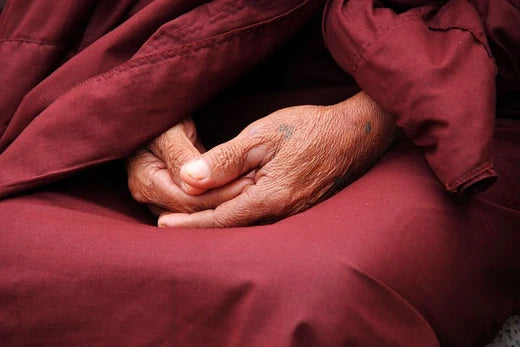What Is A Buddhist Funeral?
While different variations exist in Buddhism and its practice, all sects firmly believe in the process of reincarnation and the afterlife. When a person of the Buddhist faith passes away, a sacrosanct ceremony is organized either in the monastery or at the deceased’s family home. Buddhist funeral traditions often involve prayer and meditation, which is overseen by the monks present during the funeral service.
Buddhist Death Rituals
Given that all Buddhists hold the firm belief that the process of reincarnation starts as soon as the person passes away, there are specific rituals to be followed to ensure that the deceased are helped through their journey towards reincarnation.
- Prior to the Demise: If a loved one is ailing and is expected to pass away soon, the family must work towards creating a peaceful environment – one filled with love, joy, and serenity. During such a phase, close family members and friends will spend time reflecting on the ailing person’s noble deeds and also undertake good deeds on their behalf.
- Post the Demise: Once the person has passed away, according to Buddhist traditions, the deceased’s mortal remains must rest for a period of four hours. During such a period, absolutely no one is allowed to touch or even move the deceased’s mortal remains. This is because Buddhists believe that such a phase is when the soul leaves the body.
Buddhist Funeral Traditions
Buddhists tend to have certain funeral traditions in place, to help the deceased’s soul transition into the afterlife.
- Altar: As is generally the case, Buddhists believe in placing a photograph of the deceased next to the casket, serving as a centrepiece on the altar. In addition to this, family members and loved ones also place incense, fruits, flowers, and candles as offerings to the deceased. Finally, a small figurine of Lord Buddha is also placed at the altar.
- Funeral Service: Generally, Buddhist funeral services tend to take place in the morning, with the service being presided over by a group of monks. The funeral service is characterized by prayers, sermons, chants, and the ringing of bells/gongs. In general, Buddhist funeral services tend to last for 45 minutes to 90 minutes.
Buddhist Funeral Etiquette
Given that funeral etiquette may vary from sect to sect, the deceased’s family members will generally communicate what is expected of the guests. In general terms, when guests come to offer condolence, they must approach the altar and offer condolences by bowing with their hands in prayer. In addition to this, prior to the funeral, donations, food, flowers, and even sympathy cards can be sent over to the family. As a rule of thumb, anything red in color must be avoided.
What To Wear To A Buddhist Funeral?
In general, when someone passes away, Buddhists believe that family members should wear white clothing, while those coming to offer condolence must wear black. However, this again varies from sect to sect, with there being significant variation even among Buddhists in different countries.
Mourning Period
When it comes to death, Buddhists believe there are certain days that are considered crucial in the mourning period. Once the person has passed away and the funeral service has been conducted, rituals and prayer meetings are held on the 3rd day and then on the 7th, 49th and 100th day. In total, the entire mourning period ends on the 49th day. This is because Buddhist traditions state that the deceased is reborn 49 days after their passing. Finally, on the 100th day, the family will organize a get-together to celebrate that the deceased’s soul has now been reincarnated.
The Significance Of Death In Buddhism
While many religions worldwide believe in the decisiveness of death, Buddhists believe that death is just a step in the constant cycle of death and rebirth. Buddhism states that humans will continue to be born and reborn until they reach enlightenment, or ‘nirvana’. They believe in the law of karma – in the sense that your actions in this life will determine the quality of your next life and, ultimately, how soon you will achieve ‘nirvana’. When human beings do reach ‘nirvana’, they are then finally free of the process of birth and rebirth and will then forgo their conscious mind.

![Upgrade to Premium Weight [18-gauge steel]](http://titancasket.com/cdn/shop/products/casketthicknesswithnumbers.png?v=1680642906&width=533)



